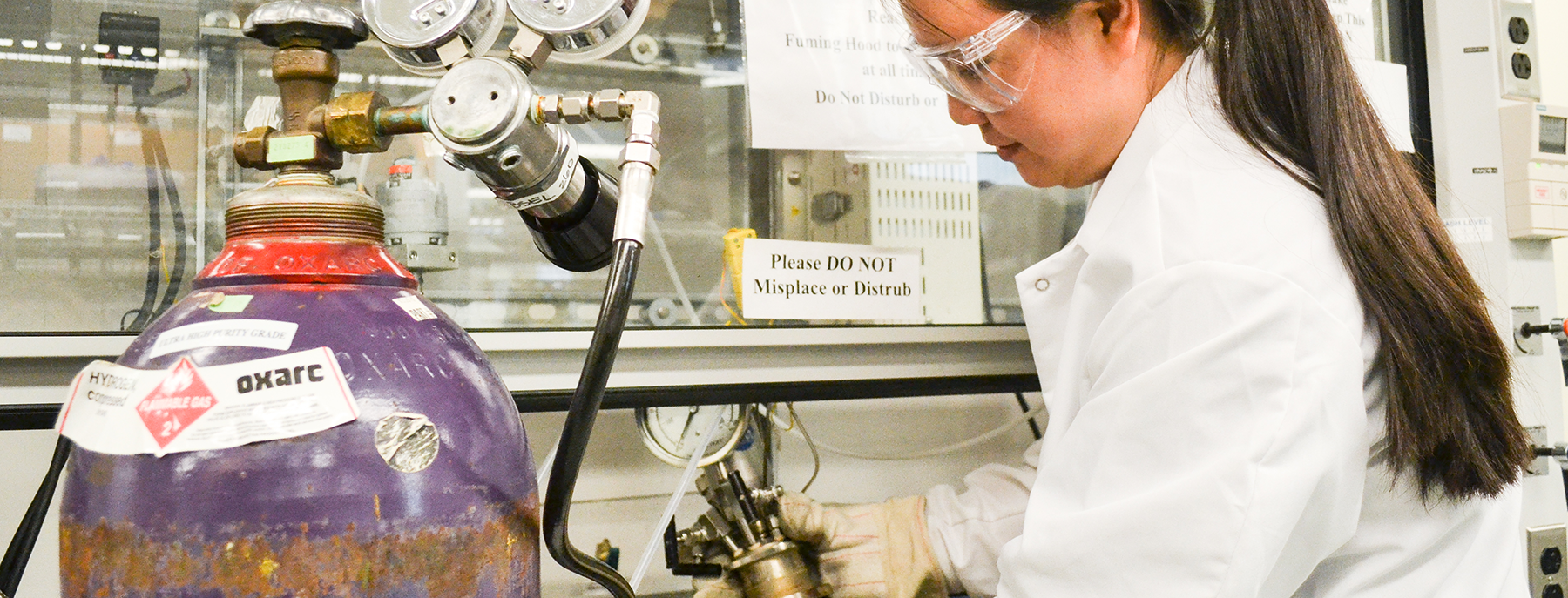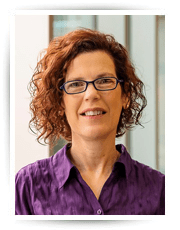
Research and Graduate Programs
WSU Tri-Cities supports the research of faculty and students at every level. We embrace a hands-on approach to learning and foster an environment of collaboration and innovation that solves complex problems, develops cutting-edge technology, and promotes discovery. Research and Graduate Programs is housed within the Office of Academic Affairs.
The Bioproducts, Sciences and Engineering Laboratory (BSEL) opened May 2008 on the Washington State University (WSU) Tri-Cities campus in Richland, Washington. The $24 million, 57,000-square-foot research and teaching laboratory is a partnership between WSU and the Pacific Northwest National Laboratory (PNNL) operated by Battelle. BSEL features the Biorefinery and the Combinatorial Catalysis Research Lab, plus a variety of laboratories and classrooms. The facility establishes the Tri-Cities as a center for world-class bio-based product research and development, creates a magnet for prominent scientists, and helps the Northwest agriculture industry be more competitive.
The mission of the Simulation and Integrated Media for Instruction Assessment and Neurocognition (SIMIAN) lab is to investigate and understand all aspects of human learning across the lifespan. These research collaborations draw together a staff of professors while supporting graduate and undergraduate researchers across the Washington State University campuses.
SIMIAN is a sister lab to the Neurocognition Science Laboratory on the WSU Pullman campus and the current areas of active research include:
STEM Education
- Student Learning
- Autism, Dementia, Mild Cognitive Impairment, and Alzheimer’s
- Development of Smart Classroom Environments
- Creation of assessment tools that support socio-emotional development, content learning, and cognitive development of students
Boasting one of only three Wine Science Programs in the country, WSU Tri-Cities remains on the cutting edge of technology and culture. Our newly opened Ste. Michelle Wine Estates Wine Sciences Center debuted in 2015 is considered one of the most technologically advanced wine science centers in the world. It features research laboratories and classrooms, a research and teaching winery, a two-acre vineyard and greenhouses to train technical personnel to support Washington’s large and expanding wine industry. Industry members, students and researchers from around the globe will use the center as a gathering place to spark innovation, fuel economic development and support local, regional, national and international collaboration and provide a catalyst for research breakthroughs.
Washington State University and the U.S. Department of Energy’s Pacific Northwest National Laboratory have a long history of collaborating on research projects as well as providing hands-on educational experiences that lead to career opportunities. In addition, more than 800 WSU alumni work at PNNL as scientists, engineers, and other professionals.
In 2018, WSU and PNNL accelerated this collaboration, expanding research and educational and training programs. They have formed three joint institutes to advance science and technology in areas that are critical for the nation and Northwest: Nuclear Science and Technology, Advanced Grid, and Bioproducts. See the news release, video, and photos from the April 3, 2018 launch celebration.
These collaborations are designed to:
- Combine the unique talents and resources of WSU and PNNL to address important scientific and technological challenges
- Elevate the quality and impact of research at both partner organizations, through seamless collaborations on multi-disciplinary projects and use of unique facilities and instrumentation at both institutions
- Educate and train the next generation of scientists and engineers in the relevant research disciplines
- Serve as a beacon for new talent in those fields
- Create and support an ecosystem of industrial, government and university participants who will benefit from the tools, technologies and discoveries that result from the Institutes.
The Washington State University Tri-Cities Institute for Northwest Energy Futures is a new research center located on the WSU Tri-Cities campus to help address the increasing demands for resilient, affordable, and available low-carbon electricity and transportation fuels.
The institute is currently developing industry partnerships for energy systems research and fostering community discussions for policy development at the state and national levels. The institute is also developing curriculum to support future workforce needs across various energy sectors.
The institute will assist local energy stakeholders with the research and analytics to better understand and manage the interrelationship between emerging clean, net-zero emission energy sources and technologies and the impacts on current energy systems, the economy, natural resources, and public policy.
The Washington State University Irrigated Agriculture Research and Extension Center (WSU-IAREC) is the focal point for the University, the U.S. Department of Agriculture – Agricultural Research Service (USDA-ARS), and the Washington State Department of Agriculture (WSDA) research, extension and plant certification programs that address the concerns of irrigated agriculture. An estimated two-thirds of the agricultural production in the state comes from irrigated land, making such research of vital interest to Washington’s economy, both for intrastate distribution and exportation.
IAREC faculty collaborate with faculty on the WSU Tri-Cities campus and work closely with our graduate students.
Travel Grants
WSU Tri-Cities travel grants help support several Tri-Cities graduate students a year as they travel to attend conferences and other professional opportunities. These awards are made possible by the generous support of the Associated Students of Washington State University Tri-Cities (ASWSUTC), Academic Affairs, donors to WSU Tri-Cities and other sources whose contributions and support are greatly appreciated.
2024-2025 Graduate Travel Grant Award Recipients
- Haley Donovan
- Kavin Thangaraj
- Meklit Melesse
- John Buster
- Aaron Pelly
- Erin Checketts
2023-2024 Graduate Travel Grant Award Recipients
- Anthony Giduthuri
- Meklit Melesse
- Sarah Dinneen Anderson
- Kyrin Gregory
- Austin Gluth
- Aaron Pelly
- Budi Harahap
- John Buster
- Rachel Berner
- Isaac Oduro
2022-2023 Graduate Travel Grant Award Recipients
- Shawnee Kasanke
- Kyrin Gregory
- Austin Gluth
- Renan Stefanini Lopes
- Budi Harahap
- Fuad Ale Enriquez
- Rachel Berner
- Madeline Lueck
- Rongge Zou
Information for ASEs (Academic Student Employees)
- ASEs at WSU Tri-Cities request time off using Workday
- Union Information for ASEs
- Representation Notice
- ASE Application for Childcare Reimbursement
- WSU/UAW Contract for ASEs
Research Spotlight Newsletter
Contact Us






